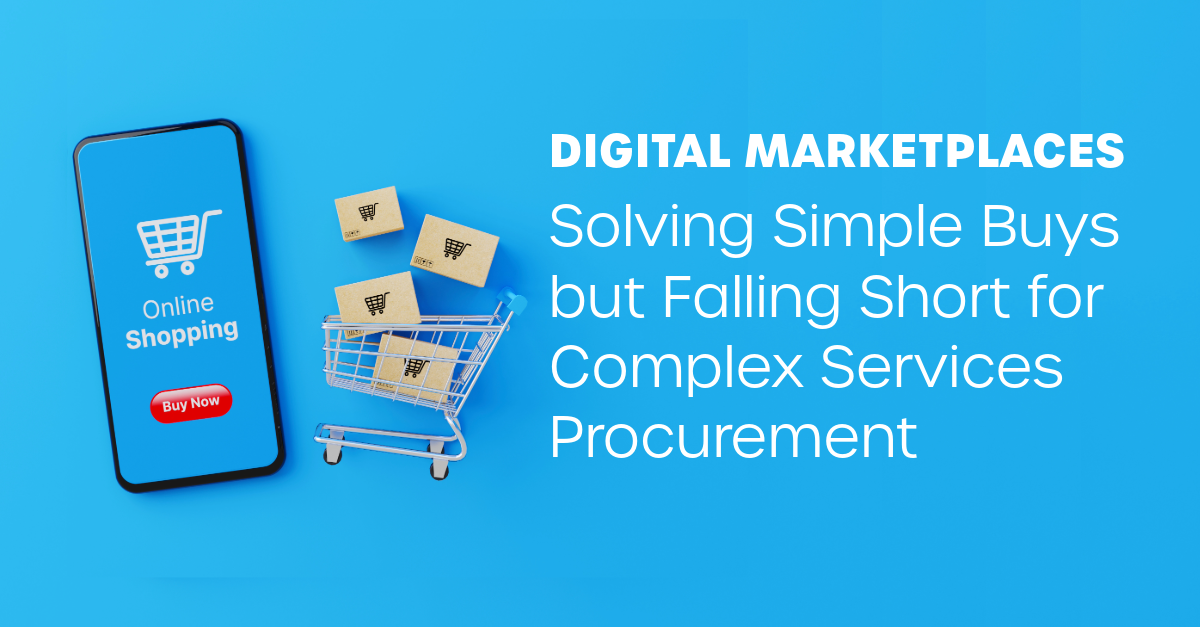The rise of digital marketplaces has significantly transformed how industries like energy, manufacturing, and infrastructure procure standard parts and equipment. With just a few clicks, operators can purchase everything from electrical to industrial components, simplifying what once was a lengthy, negotiation-heavy process. These platforms excel at handling commoditized goods, offering clear benefits like cost savings, faster turnaround times, and greater access to innovation. But when it comes to procuring complex services—such as fluid management, on-site consulting, or specialized maintenance—the process is more complicated and potentially infinitely variable.
While digital marketplaces are undeniably efficient for product procurement, they face significant challenges when applied to service-based industries. Unlike products, which can often be standardized and quantified, services like field operations, technical support, and engineering require a high degree of customization, flexibility, and human interaction. These platforms simply can’t handle the nuanced needs of complex service contracts, where the scope of work evolves, and performance is tied to specific outcomes.
The Promise of Digital Marketplaces for Standard Goods
Digital B2B marketplaces provide significant operational benefits for sourcing standard products. In sectors dealing with fragmented and opaque supply chains, these platforms can streamline processes and reduce costs:
Operational Efficiency: Automating bidding, contracts, and payments simplifies the procurement of off-the-shelf products.
Cost Reduction: Increased competition between suppliers drives down prices and boosts transparency.
Access to Innovation: Smaller suppliers can showcase new technologies to a global audience, accelerating the adoption of innovative products.
These advantages work well for standardized products. A pump is a pump, and a valve is a valve—there’s little need for customization, and most transactions follow a predictable path. Digital marketplaces can significantly reduce the time and effort needed to source, negotiate, and finalize such deals.
The Challenge of Procuring Complex Services
When it comes to procuring complex services, however, the situation is different. Services like consulting, maintenance, and field operations require more than a fixed-price, off-the-shelf contract. They demand a high level of customization, flexibility, and ongoing performance tracking. Digital platforms that are optimized for products simply can’t manage the dynamic nature of service procurement. Here are the key challenges:
1. The Need for Custom Contracts
Services such as maintenance or consulting often don’t fit into a standardized, one-size-fits-all contract. Operators rarely know exactly how many service hours they’ll need, and the scope of work may shift as the project progresses. Generic contracts offered by digital marketplaces are ill-equipped to handle these variations. To procure complex services effectively, operators need tailored contracts that reflect specific needs, performance criteria, and pricing models.
For instance, fluid services might be priced at $150 per hour, but the actual number of hours required is unpredictable. The ability to adjust contract terms in real time—based on evolving project demands—is crucial, but many platforms lack this flexibility. Over 70% of upstream spend* in the energy industry is for complex services.
*Based on total expenditure attributed to upstream spending by operators within the energy industry.
2. Real-Time Monitoring and Adjustments
Unlike product procurement, where terms are clear and delivery is fixed, services often require adjustments throughout the lifecycle of the project. On-site maintenance or consulting may need to be altered as conditions change. Digital marketplaces, designed for static transactions, typically lack the necessary tools for real-time updates. Operators need to renegotiate terms, revise timelines, or introduce new deliverables, which is difficult to manage through rigid, product-centric platforms.
3. Performance-Based Contracts
In many service contracts, especially in energy and industrial sectors, compensation is tied to specific performance outcomes, such as uptime guarantees or efficiency improvements. Managing these performance-based contracts requires ongoing tracking and real-time performance data—something that digital marketplaces, focused on simple transactions, aren’t built to handle.
Why Traditional Marketplaces Can’t Replace Personalized Service Procurement
Digital marketplaces excel at managing standardized product transactions. However, when the procurement process shifts to complex services, it demands a tailored approach—one that incorporates flexibility, real-time communication, and the ability to adjust contract terms as conditions change. Services such as those offered by companies like Baker Hughes and Halliburton—on-site support, consulting, and specialized field services—cannot be reduced to a simple, fixed-price transaction. These services require custom contracts, dynamic pricing models, and ongoing adjustments, which digital platforms focused solely on products and simple services are ill-equipped to manage.
Energy Industry’s Initiatives to Address the Complex Services Procurement Gap
As one of the most complex industries, the energy industry supply chain involves unique complexities that distinguish it from traditional purchasing models. Unlike standard procurement, these services are often purchased as outcomes rather than specific items and quantities, with pricing intricately tied to variable factors like temperature, depth, and specific contract conditions. Purchase orders tend to be broad or limited, with actual items and quantities only becoming clear after work completion. This complexity necessitates sophisticated invoice validation processes that typically require manual review and detailed supporting documentation such as field tickets. The inherent variability demands flexible contract terms, standardized coding systems, and adaptive workflows that can accommodate the nuanced nature of upstream service procurement. To manage these challenges, operators are increasingly turning to automated price validation systems and international standards that can help streamline the procurement-to-pay process while maintaining the necessary flexibility to account for the industry’s unique transactional landscape.
The Role of Automated Price Validation (APV)
One way to streamline the procurement of complex services is through Automated Price Validation (APV). APV automates the process of comparing invoices with the terms of supplier contracts, ensuring that price validation occurs with minimal human intervention. This automates price validation across the Procurement-to-Pay (P2P) process, ensuring compliance with agreed pricing, reducing errors, and minimizing disputes.
Implementing APV in the procurement of complex services offers several benefits:
- Efficiency Gains: By automating price validation, operators can approve and validate invoices with little or no human intervention, reducing overhead and administrative burden.
- Faster Dispute Resolution: APV provides rapid feedback to suppliers when discrepancies arise, shortening the dispute resolution process and reducing associated costs.
- Improved Cost Control: APV helps reduce the operator’s cost of price validation by up to 20% to 80%*, depending on the service category, by decreasing the time and resources spent on reviewing invoices and disputes.
- Better Spend Visibility: The structured data generated by APV facilitates enhanced spend analytics, helping operators track procurement activities, forecast budgets more accurately, and improve financial decision-making.
By integrating APV into the service procurement process, operators gain greater control over contract compliance, visibility into spending, and better management of maverick spend—which is especially important during periods of market uncertainty or price volatility.
* OFS Portal LLC. (2015, February 25). Automated Price Validation: Applying Automation and Standards to Improve the eP2P Process in the Oil and Gas Industry. OFS Portal LLC.
Don’t Overlook Cybersecurity and Data Privacy in Service Procurement
As companies become more dependent on digital platforms for both products and services, the importance of cybersecurity and data privacy grows. These platforms handle highly sensitive data, including contracts, financial transactions, and proprietary service details, all of which are prime targets for cyberattacks. A breach could expose companies to intellectual property theft, financial loss, and reputational damage.
Digital platforms must implement robust cybersecurity protocols to protect the integrity and confidentiality of transactions and data. Technologies such as blockchain are increasingly being explored to safeguard digital transactions, offering a decentralized, tamper-resistant ledger to secure supply chain data. However, adopting these advanced technologies requires investment in infrastructure and can add short-term complexity and cost.
Furthermore, platforms must ensure compliance with data privacy regulations, such as the GDPR in Europe and the CCPA in the U.S. This adds another layer of complexity, as platforms must implement comprehensive data protection measures to avoid penalties and maintain customer trust.
A Holistic Approach to Service Procurement
While digital marketplaces are transforming procurement for standardized products, they fall short when it comes to the complexities of service procurement. Services require a more tailored, flexible approach—one that allows for dynamic pricing, customized contracts, and real-time adjustments.
By integrating tools like the OFS Portal Catalog Management & Syndication and APV, companies can effectively manage the procurement of complex services alongside product sourcing. These tools streamline procurement, improve compliance, reduce disputes, and ensure that services are provided as agreed upon, without commoditizing the unique value they bring.
With over 25 years of experience in digitally enabling complex services procurement and seamlessly integrating with Purchase-to-Pay systems, OFS Portal has collaborated with many leading Oilfield Services companies. Our practical and results-driven expertise ensures that your team can effectively navigate and understand the intricacies of complex services procurement.
Contact us today to learn more about how our tools can help your organization manage complex service procurement and enhance your overall operational strategy.

